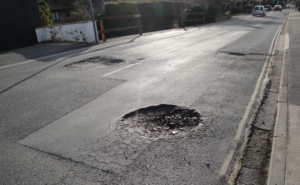18 October, 17 / Asphalt Repairs
While some potholes can be seen in plain sight, others remain hidden until you drive or stumble right over them. No matter what type of pothole you’re dealing with, the experts at Sunland Asphalt are here to provide you with some industry insight about how they form, how to fix them, and how to prevent them.
Pothole Formation
It’s a mix of traffic, shifting temperatures and water that creates pesky potholes. Warm daytime temps can cause asphalt to expand if there’s any water underneath the asphalt or if water has infiltrated the asphalt through surface cracks. At night, the water and asphalt cool down and contract back into shape. Besides water and temperatures, the stream of traffic rolling over the asphalt can cause even more stress, which makes it possible for even more water to find its way into the asphalt.
The weaker asphalt becomes, the easier it is for traffic to wear down the material. Over time, a pothole forms when rolling tires brush away the worn-out material. It’s common for most potholes to appear in the spring when daytime temperatures are higher than cool nighttime temperatures.
Pothole Repair
Should potholes appear on roads, it’s best to take care of them as soon as possible. This is because potholes can lead to major accidents on the roadways, and you do not want to be liable for such accidents or the fallout that results. Know that Sunland Asphalt specializes in professional asphalt repair and we use several different methods for taking care of potholes to better guarantee quality results, both structurally and aesthetically. For instance, we can patch up, remove and replace, skin or surface patches to restore asphalt to optimum performance and appearance.
With the remove-and-replace option, sawing removes the distressed asphalt, and hot-mixed asphalt makes the area whole. Skin and surface patching involves spreading hot-mixed asphalt over the pothole. Another option is to position a skin patch over a fabric inner layer situated between the asphalt and the patch itself.
Pothole Prevention
In the asphalt business, we’ve found that prevention is always preferable to finding a solution, and we’re sure you’ll agree. When it comes to potholes, there are things you can do to lessen your chances of the structure of your asphalt becoming compromised.
The first time you notice cracks forming in your asphalt, you can be sure the formation of potholes won’t be too far behind. For that reason, you’ll want to consider what’s known as crack sealing, which uses a hot or cold sealant to essentially “staple” the pavement back together. Another way to keep water from working its way into your asphalt is through sealcoating. Not only is this method great for acting as a barrier for water, but it also improves the overall appearance of your asphalt.
No matter the method to prevent potholes and the cracks that often lead to potholes, proper cleaning of the cracks is essential beforehand so the applied material can properly stick to the cracks. The sealant substance also needs correct application, such as applying it from the bottom to the top. This is mainly to stop bubbles from forming, which can lead to weak spots.
Finally, one of the best ways to prevent potholes and various other mishaps common to asphalt is to rely on a reputable contractor to take on your asphalt project. Contractors who use premium materials and techniques know which steps to take to strengthen asphalt and make it more resistant to avoidable breakdowns in the future. While this is not a guarantee that you’ll never have to deal with potholes or cracked concrete, dealing with qualified, licensed and insured contractors most certainly goes a long way when it comes to final results.
Is your property full of pesky potholes? Call Sunland Asphalt to scope your property with a free estimate. Sunland Asphalt is the most reliable asphalt maintenance contractor in the southwest and our crew is ready to execute any pavement maintenance solution to meet your schedule and your budget.
Copyright 2022 • Sunland Asphalt & Construction, LLC
Copyright 2022
Sunland Asphalt & Construction, LLC